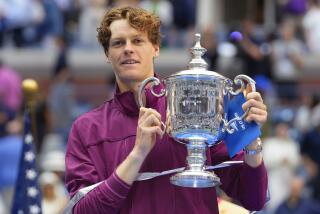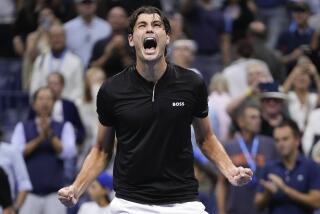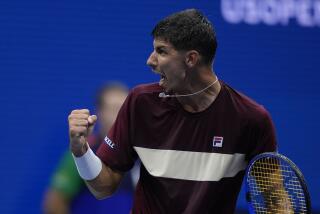Lendl Is Survivor After Five Hours : U.S. Open: He beats Becker in tournament’s longest match since 1970.
- Share via
NEW YORK — Ivan Lendl, the gaunt 32-year-old former champion who many thought had left his best days behind him, came up with a night to remember Tuesday.
In a classic duel at the U.S. Open, Lendl matched his low, sweeping backhands against Boris Becker’s powerful serves and walked away a winner in the tournament’s longest match since 1970.
Lendl’s margin of victory was a single service break in the fifth set to outlast Becker, 6-7 (7-4), 6-2, 6-7 (7-4), 6-3, 6-4, in 5 hours 1 minute.
It was the longest match at the U.S. Open since the advent of tiebreakers in 1970, breaking the previous mark of 4 hours 55 minutes in the 1988 final between Lendl and Mats Wilander.
“It’s nice because I always felt I still have it in me and it’s coming together,” said Lendl, whose career seemed to be in decline since he won his eighth Grand Slam title at the 1990 Australian Open.
It was a courageous, if often ragged, performance by Becker, who had 19 aces, but also 13 double faults and made the same number of winners and unforced errors-65.
Becker, who made an incredible 155 advances to the net during the marathon fourth-round match, seemed to make almost as many walks to the umpire’s chair to complain to Richard Kaufman, mostly about Lendl allegedly stalling on big points.
Becker trudged off the court at 12:45 a.m. Wednesday and waved to the crowd. He had never lost to Lendl in five other matches in Grand Slam events--three of them finals--1986 Wimbledon, 1989 U.S. Open, 1991 Australian Open.
As he met reporters at 1:05 a.m., he was philosophical.
“Sometimes the dice are not falling for you,” Becker said. “On some days, you are just meant to lose.”
All in all, it was a long and strange day--and night--dominated by five-set matches.
Stefan Edberg began the trend. Edberg, who looked as if he wouldn’t lose a set until a fiord freezes over, lost two of them Tuesday. But he didn’t lose three, instead coming back from 1-3 in the fifth set to defeat Richard Krajicek, 6-4, 6-7 (8-6), 6-3, 3-6, 6-4.
All it took for the defending champion, who had not lost a set coming in, was 4 hours 19 minutes of roller-coaster tennis, including his two blown set points to lose the second set, dropping four straight games in the fourth set and serving two touchdowns and one extra point worth of double faults.
Then, when Krajicek took a 3-1 lead to start the fifth set, Edberg took stock of his situation.
“At that time, it was not good news,” he said.
Eventually, there was some good news for Michael Chang, delivered some 3 hours 34 minutes after he began his fourth-round match with MaliVai Washington and arriving in the form of a forehand slugged cross-court on match point in the fifth set.
Safe at last, Chang cast his eyes upward and knocked a ball into the stands after finally subduing Washington, 6-2, 2-6, 3-6, 6-3, 6-1.
“I dodged a few bullets tonight,” said Chang, a quarterfinalist at the Open for the first time.
For Washington, it was merely a continuation of some ruinous bad luck--his sixth consecutive five-set defeat--all in Grand Slams.
Washington thought a change of fifth-set tactics might help.
“Maybe I should grab a gun and shoot the guy or something and maybe I will win the fifth set,” he said.
Chang will face Wayne Ferreira in the quarterfinals after the 20-year-old South African defeated Emilio Sanchez in a rare four-set match, 6-2, 6-4, 2-6, 6-4.
Krajicek’s hopes for his first U.S. Open quarterfinal ended at the precise moment of the fifth set when Edberg launched a backhand return and sent the ball spinning crazily, high into the air.
The ball seemed to float on, and as it kept going, all eyes followed its trajectory--over the net, over Krajicek, over the service line, finally landing a foot inside the baseline.
With that one shot, Edberg at last had found the break he needed. Down 2-0 and 3-1 to start the fifth set, Edberg’s lucky lob broke back, evened the set at 4-4 and sort of signaled a change in the, well, luck.
“I had luck because it was reflex off the return and the ball took a funny little curve in the air,” Edberg said. “He didn’t really have a chance on it. It was a perfect lob.”
And afterward, Krajicek said he felt perfectly awful about it.
“It hurt in my heart and in my stomach,” Krajicek said. “It was not a nice feeling.”
He would feel even worse in the next game. Edberg, who had trouble with his serve all the way, fell behind 15-40 on his 13th and possibly ugliest double fault of the match as the ball met the net halfway up.
Presented with the opportunity to serve for the match if he converted just one of the two break points, Krajicek faltered.
Edberg saved one break point with a hard serve to the body that Krajicek fought off only to see Edberg angle a volley into the corner.
Then at 30-40, Krajicek looked at a second serve from Edberg, took a big swing and sent it just long. Edberg eventually held from deuce, but Krajicek refused to feel badly about missing those two chances.
“I went for it, I cannot say I held back or anything, so I cannot be angry about that,” Krajicek said. “They just didn’t go in.”
Instead of serving for the match, Krajicek now needed to hold to stay in it. The second biggest point of the match occurred at 30-30: In a volley duel, Edberg and Krajicek squared up and faced each other on opposite sides of the net, like two gunfighters on Main Street, a rapid-fire battle that lasted until Edberg put a backhand volley away.
It was now match point. Edberg returned a second serve and Krajicek dumped a shaky forehand volley into the net to end it. Even after 258 minutes of tennis, it still seemed sort of an abrupt ending.
“I blew it,” said Krajicek, who was not at all pleased that his first-serve percentage was only 46% and that he had nine double faults.
“I was serving pretty pathetic,” he said. “Somehow, he pulled it out. I don’t know how, but it happens.”
U.S. Open Notes
Is it the start of a U.S. Open tradition? Jim Courier vs. Andre Agassi? It might not be Jimmy Connors vs. John McEnroe, or Connors vs. Ivan Lendl, but the quarterfinal match pairing of the two power-stroking former school chums from the Nick Bollettieri Tennis Academy, Davis Cup teammates who once didn’t like each other, is one of the showcase matches of the tournament so far. Courier leads the series, 5-4, having won the last four, two of them at the French Open. With a Wimbledon title under his belt, Agassi said he is as confident as he has ever been, but can’t say he is as tough mentally as Courier.
In another quarterfinal, Pete Sampras would seem to have an edge on Petr Korda. Sampras is 4-1 against Korda and has beaten him on all four surfaces--grass, clay, hard court and carpet. . . . Steffi Graf is 15-2 against quarterfinal opponent Arantxa Sanchez Vicario. Manuela Maleeva Fragniere plays her sister, Magdalena, in the other quarterfinal.
More to Read
Go beyond the scoreboard
Get the latest on L.A.'s teams in the daily Sports Report newsletter.
You may occasionally receive promotional content from the Los Angeles Times.










